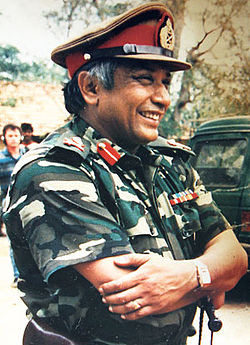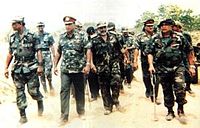- Denzil Kobbekaduwa
-
Denzil Lakshman Kobbekaduwa 
Lieutenant General Denzil KobbekaduwaBorn 1940 Died 1992 † Allegiance  Sri Lanka
Sri LankaService/branch Sri Lanka Army Years of service 1960-1992 Rank Lieutenant General Unit Sri Lanka Armoured Corps Commands held Overall Operations Commander, Northern Sector,
GOC 2 DivisionBattles/wars 1971 Insurrection, Sri Lankan Civil War Awards Rana Wickrama Padakkama,
Rana Sura Padakkama,
Vishista Seva Vibhushanaya,
Uttama Seva PadakkamaLieutenant General Denzil Lakshman Kobbekaduwa RWP, RSP, VSV, USP, rcds, psc, SLAC (In Sinhalese: ලුතිනන් ජෙනරාල් ඩෙන්සිල් ලක්ෂ්මණ් කොබ්බෑකඩුව) (July 27, 1940 – August 8, 1992) was a highly decorated and respected General in the Sri Lanka army. He was assassinated along with 9 other military officers in a land-mine explosion.
Contents
Early life
Born into a typically Kandyan family, the second child and eldest of three sons, Kobbekaduwa was educated at Trinity College Kandy. At school he excelled in sports, especially rugby football, playing as scrum half. He continued to play even after he had joined the army. He also played rugby football for Sri Lanka, and coached, refereed and administered the game on a national level. He was also a Board member of the Duncan White Sports Foundation.
Military career
Lt. General Kobbekaduwa joined the army in May 1960 and received his training at the Royal Military Academy Sandhurst in England. After returning to Sri Lanka, he was commissioned as a Second Lieutenant in the 1st Reconnaissance Regiment of the Sri Lanka Armoured Corps. Although the army was more a parade ground army at that time, Lt. General Kobbekaduwa was to see it turned into a well trained, battle hardened and disciplined army. Lt. Kobbekaduwa was well liked both by his superiors, peers, and subordinates, and his promotions within the army came swiftly, despite twice being a victim of political interdictions in 1977 and 1965 when he was sent on compulsory leave following an attempted coup d'état but was returned to active service in 1970. General Kobbekaduwa was a graduate of Royal College of Defence Studies and the British Army Staff College at Camberley. He was promoted to Major General in 1990 and was posthumously promoted to Lieutenant General in 1992.
Kobbekaduwa was an excellent strategist, who could obtain maximum advantage from minimum resources. Even the LTTE fighters respected Kobbekaduwa’s strategic skills and military tactics.
He was quoted as saying "Why should we let anyone else fight our war?" The IPKF, unhappy with his presence at the front, complained twice. His sense of justice made him realise that although the Tigers were all Tamil, this did not necessarily mean that all Tamils were LTTE. He wanted to win the confidence of the civilian population and make them realise that they were better off trusting the government army.
He was fighting an enemy who had a large stock of arms and an advanced military infrastructure with limited manpower and finances. This made it difficult to hold on to territory, subjugating the people of the area to a military rule while continuing to wage war against a guerrilla army.
He used three principles in his counter-insurgency war measures: firstly, he did not believe in holding down land, secondly, he believed in drawing the enemy away from populated areas to minimise civilian deaths and with advance manoeuvring and superior fire power strain and destroy the enemy fire power, and thirdly make the civilians realise that they were better off trusting the armed forces. In fact, the UNHCR paid a tribute to him for his humanitarian approach to the beleaguered Tamil population.
Denzil Kobbekaduwa has been called an "exceptional Third World General". This is not to denigrate him but shows how good he was at carrying out a campaign under third world situations, where funds were limited and every resource had to be carefully nursed. It was Kobbekaduwa who in 1985 waged war with the LTTE on two fronts.
Famous military operations
Operation Liberation
Main article: Vadamarachchi OperationThe “Operation Liberation” or “Vadamarachchi Operation”, the military offensive carried out by the Sri Lankan military during May to June 1987, to re-gain the territory of Vadamarachchi in Jaffana peninsula from the LTTE control. This military offensive marked in Sri Lankan military history as first ever engaged in conventional warfare in Sri Lankan soil after the British colonial rule.
Brigadier Denzil Kobbekaduwa and Colonel Vijaya Wimalaratne are the two key military personnel who committed themselves to gain the victory for the government troops. The President Mahinda Rajapaksa government’s “Secretary of Defence” Gotabaya Rajapaksa then as a Major also participated in the military offensive along with them. Former Sri Lankan President J.R Jayewardene and minister of National Security Lalith Athulathmudali held the political leadership for the operation until the government of India violated the Sri Lankan air space using the Indian air force to drop food over Jaffna (Operation Poomalai) on June 4, 1987, which forced the government to accept Indo-Lanka Peace accord.
The offensive started on May 26, 1987 under the leadership of two commanders battalion consisting around 8,000 troops from “Gemunu Watch” and “Gajaba Regiment”, supported by the Sri Lanka Air Force. The difficulty for the troops to out from Thondamanaru area because LTTE exploded the Thondamanaru bridge to delay the troops reaching Valvettithurai, the native place(home town) of LTTE leader Prabhakaran. On May 28, troops managed to capture Udupiddy and Valvettithurai, and another military column captured Nelliady and advanced towards Point Pedro without giving any possibility to re-grouping of the LTTE units. In the first week of June, troops managed to gain control over the entire zone and captured a large cache of arms left by LTTE. The military intelligence disclosed the LTTE leader Prabakaran along with Sea Tiger leader Soosai narrowly escaped from advancing troops.
Operation Balavegaya
(L-R) Brig. Vijaya Wimalaratne, Commander of the army Lt.Gen. Cecil Widyarethne, Commander of the Navy Vice Admiral Clancy Fernando and Maj.Gen. Kobbekaduwa during the "Balavegaya 2". Main article: Operation Balavegaya
Main article: Operation BalavegayaOne of the most famous victories executed by Lt. General Kobbekaduwa was the manner in which he broke the siege of Elephant Pass. Elephant pass has been known as "Alimankada" in historical times. The attack on the army camp at Alimankada (Elephant Pass), which was launched in July 1991 was planned by Prabhakaran himself who named it "Operation Charles Anthony". Charles Anthony, alias Seelan had been Prabhakaran’s closest ally and it was in retaliation for his death that the landmine which killed an officer and 12 young soldiers was set off in July 1983.
Prabhakaran even came out of hiding to visit the LTTE forward areas prior to launching the attack. Civilians were co-opted to man supply lines and hospitals and provide other services with all available transport being requisitioned and hundreds of coffins being stockpiled in readiness for the operation. The attack was launched with about 3000 personnel (men and women drawn from the North and East) but at the height of the battle this number rose to about 6000. The LTTE leader was willing to sacrifice anyone to win this location while he directed the attack himself from his hideout in Chavakachcheri.
The tactics used by Lt. General Kobbekaduwa in breaking this siege were unprecedented in the annals of Sri Lankan military history. Though the battle plans for Operation Balavegaya one was drawn up at the Joint Operations headquarters in Colombo the execution of these plans was in the hands of Lt. General Kobbekaduwa.
With no tanks and heavy armour, 8000 men were deployed for the rescue mission to relieve the besieged camp and regain territory captured by the LTTE. This was an amphibious operation backed with helicopters carrying troops. Lt. General Kobbekaduwa was in the landing craft leading his men from the front, taking the same risks as his men.
The resistance was so intense that some battalion commanders were considering aborting the operation temporarily. Lt. General Kobbekaduwa wanted to go ahead. In this he was supported by Brigadier Vijaya Wimalaratne, who died in the same bomb blast at Araly Point. Despite heavy enemy firepower, the taskforce established a beachhead at Veralakuruna (Vettilaikerny).[1]
The Adampan (Attampana) operation is one such instance. Here the armed forces waged a two prong attack one in the south-eastern entrance of Madhu Adampan base region while the main thrust was in the north western sector. It was only later the LTTE realised that while their forces were engaged the army had interdicted their supply lines in the area where the Mannar coast was linked to the jungle base of the Wanni.
Death
On August 8, 1992 Maj. General Kobbekaduwa, General Officer Commanding Northern Sector, Brigadier (posthumously Major General) Vijaya Wimalaratne, Jaffna Brigade Commander and Commodore (posthumously Rear Admiral) Mohan Jayamaha, Commander Northern Naval Area were killed when the Land Rover they were traveling in was destroyed by a land mine blast. Seven others were killed in the explosion, including Lt. Colonels G.H. Ariyaratne, A. Palipahana, H.R. Stephen, all three battalion commanders, Lieutenant Commander Asanga Lankathilaka, Lieutenant Commander C.B Wijepura [2] and Major N.S. De Alwis, General Kobbekaduwa's ADC.[3]
They were planning an offensive code named "Operation Final Countdown" to liberate the northern peninsula from the LTTE, which was to be launched shortly. The final decision was delayed until they could reconnoiter in a particular area to finalise troop movements, which required a visit to Araly point the next day. As they were returning to be taken back to the base by helicopter, the incident occurred.
An explosion was heard by two Majors who were watching the Land Rover jeep in which the three military leaders were traveling. Majors Rupasinghe and Induruwa were 400 yards away from the jeep. When they came running up, they found that except for two persons, the others, whose bodies were mutilated, had died instantaneously.
The officer's wife, Lali Kobbekaduwa, called for an international commission into the incident.[4] This was not granted, but the Sri Lankan Government set up their own commission to investigate.
A Presidential Commission carried out by the Sri Lankan Government concluded that the President Ranasinghe Premadasa as well as members of the Sri Lankan Army such as Major W A N M Weerasinghe were "directly responsible" for his death.[5]
See also
Further reading
- Army, Sri Lanka. (1st Edition - October 1999). "50 YEARS ON" - 1949-1999, Sri Lanka Army. ISBN 995-8089-02-8
- War and Peace in Sri Lanka: With a Post-Accord Report From Jaffna. ISBN 9552600014/ISBN 978-9552600012, Institute of Fundamental Studies, Sri Lanka; 1 edition (October 1, 1987), By Rohan Gunaratna.
- The Broken Palmyra - The Tamil Crisis in Sri Lanka: An Inside Account. The Sri Lanka Studies Institute, Claremont 1990. By Hoole, R., Somasundaram, D., Sritharan K., and Rajini Thiranagama. (Also available online [1].)
- Indian intervention in Sri Lanka: The role of India's intelligence agencies. ISBN 9559519905/ISBN 978-9559519904, South Asian Network on Conflict Research (1993), By Rohan Gunaratna.
References
- ^ "Sri Lanka's Tamil Tigers". TIME. September 16, 1991. http://www.time.com/time/magazine/article/0,9171,973838,00.html.
- ^ Great Generals remembered with respect, gratitude and affection
- ^ Warriors of our time
- ^ Kobbekaduwa Commission Crisis: Bar to defend Upawansa Yapa
- ^ SRI LANKA: THE UNTOLD STORY CHAPTER 52: President blamed for assassinations
External links
Categories:- 1940 births
- 1992 deaths
- Sri Lankan generals
- Sinhalese people
- Landmine victims
- Sri Lankan military personnel killed in action
- Assassinated military personnel
- People assassinated by the Liberation Tigers of Tamil Eelam
- Alumni of the Royal College of Defence Studies
- Graduates of the Staff College, Camberley
- Sandhurst graduates
- Old Trinitians
Wikimedia Foundation. 2010.


